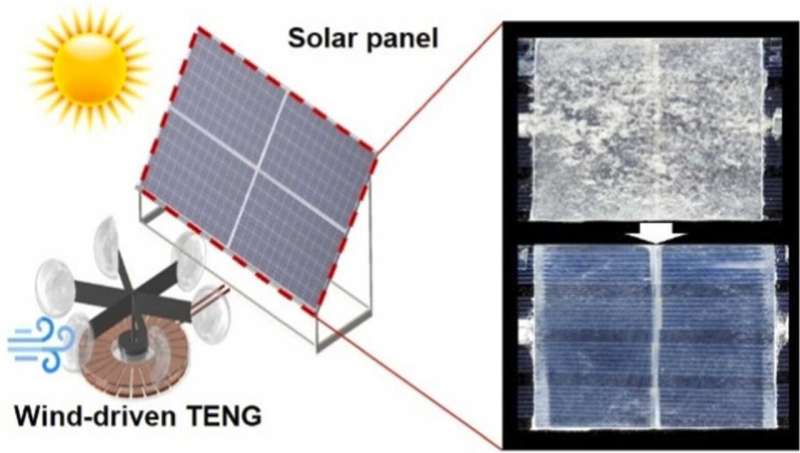Increasing the efficiency of eco-friendly solar cells by converting wind energy into high-voltage electricity
A research team led by Professor Lee Ju-hyuck of DGIST in the Department of Energy Science & Engineering has successfully developed an energy harvesting device that enhances solar energy efficiency by removing and preventing surface contamination on solar cells.
The device, developed through joint research with Dr. Seung Wan-chul of the Samsung Electronics Mechatronics & Manufacturing Technology Center, converts frictional force into electrical energy using a friction electrification power generator and applies it to an electrodynamic screen to prevent and remove contamination on the surface of solar cells, thus consistently maintaining their solar power generation efficiency.
Solar cells are being recognized as a sustainable energy source, but they demand regular maintenance due to the potential decline in energy production caused by surface contamination of the panels. Traditionally, human labor has been required to spray high-pressure water to clean dust from solar panels.
However, employing human workers in extreme environments such as deserts, mountainous regions, and even outer space is impractical. Therefore, research on an unmanned technology to prevent and remove surface contamination from solar panels has been ongoing.
Research has been underway on the utilization of an electrodynamic screen technology that displaces particles through the generation of high voltage in the form of alternating current on electrodes in a specific pattern. However, this technology incurs a loss in solar power generation due to the need for alternating current and high voltage.
To overcome this limitation, the research team innovated an energy harvesting technology that reuses consumed or discarded energy as electrodynamic screen technology. The team developed a friction electrification power generator that generates high-voltage energy from wind rotation.
To test its applicability, the researchers analyzed the relationship between wind speed and output based on changes in voltage output with respect to the device’s rotation speed. The results showed that fast rotation due to high wind speed generated high voltage (up to 2,300 V). Further, the solar cells’ output was restored by at least 90% when surface contamination was removed using the self-generating electrodynamic screen fabricated with the developed device.
Dr. Lee stated, “This research enabled us to develop the technology to prevent and remove surface contamination on solar cells by converting wind energy found in nature into electrical energy. We will continue researching further technological advancements to explore ways to maximize the efficiency of solar energy, which is a key future eco-friendly energy source.”
The study is published in the journal Nano Energy.
More information:
Minsu Heo et al, Self-powered electrodynamic dust removal for sustainable solar panels using triboelectric nanogenerators, Nano Energy (2024). DOI: 10.1016/j.nanoen.2024.109257
Provided by
DGIST (Daegu Gyeongbuk Institute of Science and Technology)
Citation:
Increasing the efficiency of eco-friendly solar cells by converting wind energy into high-voltage electricity (2024, March 29)
retrieved 30 March 2024
from https://techxplore.com/news/2024-03-efficiency-eco-friendly-solar-cells.html
This document is subject to copyright. Apart from any fair dealing for the purpose of private study or research, no
part may be reproduced without the written permission. The content is provided for information purposes only.

Comments are closed